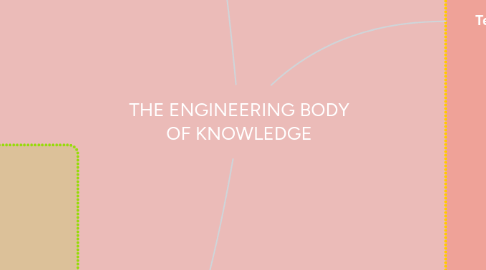
1. Technical
1.1. 4. Manufacturing / Construction
1.1.1. major factor in determining the quality of life
1.2. 5. Design
1.2.1. Makes ideas become reality and enables useful products and projects to be manufactured and constructed
1.3. 6. Engineering Economics
1.3.1. Economic analysis is essential in comparing alternatives
1.4. 7. Engineering Science
1.4.1. the bridge from pure science to engineering
1.5. 8. Engineering Tools
1.5.1. Engineers must keep abreast of the tools being used and developed in their area of expertise
1.6. 9. Experiments
1.6.1. Experiments provide insight into cause and effect by demonstrating what outcome occurs when a particular factor is changed
1.7. 10. Problem Recognition and Solving
1.7.1. recognizing and solving problems
1.8. 11. Quality Control and Quality Assurance
1.8.1. how well the results conform to all requirements
1.9. 12. Risk, Reliability, and Uncertainty
1.9.1. essential in engineering practice
1.10. 13. Safety
1.10.1. safety is an integral component of design to ensure the safety of workers and consumers of products
1.11. 14. Societal Impact
1.11.1. An understanding of societal context is a critical aspect of most engineering activities
1.12. 15. Systems Engineering
1.12.1. seeks to make the best use of personnel, material, equipment, and energy
1.13. 16. Operations and Maintenance
1.13.1. The safe, reliable, and cost-effective operation and maintenance of engineered systems and works requires engineering supervision
1.14. 17. Sustainability and Environmental Impact
1.14.1. focus on sustainable materials, processes, systems, and resource and energy use
1.15. 18. Technical Breadth
1.15.1. engineers need to have working knowledge of other disciplines
1.16. 19. Technical Depth
1.16.1. technical depth in a given field becomes more important
2. Basic or Foundational
2.1. 1. Mathematics
2.1.1. enables engineers to use logic and calculations to work on practical problems
2.2. 2. Natural Sciences
2.2.1. Physical and biological sciences are the foundation of engineering
2.3. 3. Humanities and Social Sciences
2.3.1. examine the “what” of human values and the “how”
3. Professional Practice
3.1. 20. Business Aspects of Engineering
3.1.1. work within a business framework and must recognize the related opportunities and constraints
3.2. 21. Communication
3.2.1. An engineer needs to communicate effectively with technical and nontechnical audiences
3.3. 22. Ethical Responsibility
3.3.1. Ethical values and principles manifest themselves in all engineering practice areas
3.4. 23. Global Knowledge and Awareness
3.4.1. The effectiveness of engineers will increasingly be determined by their understanding of global developments and influences
3.5. 24. Leadership
3.5.1. a leadership mode moves a team or group into new areas
3.6. 25. Legal Aspects of Engineering
3.6.1. must be aware of and comply with applicable local, state, and federal laws and regulations
3.7. 26. Lifelong Learning
3.7.1. necessary in order to remain current in the midst of changes in knowledge, technology, and tools
3.8. 27. Professional Attitudes
3.8.1. attitudes are important components of professionalism
3.9. 28. Project Management
3.9.1. The process by which an engineering organization meets deliverable, schedule, and budget requirements and manages human resource
3.10. 29. Public Policy and Engineering
3.10.1. all engineers are impacted
3.11. 30. Teamwork
3.11.1. Engineers serve on teams and must function effectively as team members
